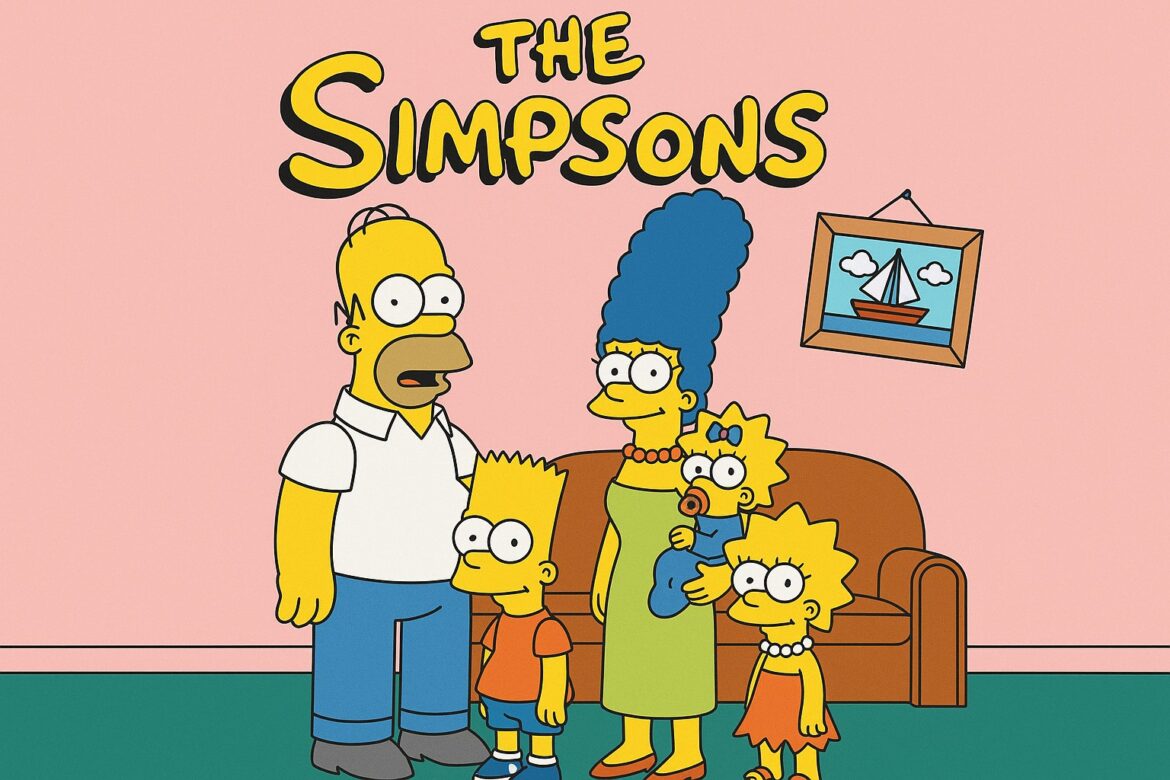
Since its debut in 1989, The Simpsons has become one of the most influential and longest-running television shows in history. What began as a series of animated shorts on The Tracey Ullman Show evolved into a prime-time animated sitcom that has reshaped not only the world of animation but also modern satire and social commentary. Created by cartoonist Matt Groening, The Simpsons has amassed a vast and loyal fanbase, garnered critical acclaim, and left an indelible mark on pop culture. This essay will explore the history, themes, characters, and lasting legacy of The Simpsons, demonstrating how it has become a mirror of American society and a global cultural icon.
Origins and Development
The Simpsons was created by Matt Groening, who initially gained recognition for his comic strip Life in Hell. In 1987, Groening was approached by producer James L. Brooks to develop animated shorts for The Tracey Ullman Show. Not wanting to give up rights to Life in Hell, Groening created an entirely new set of characters: the Simpson family, named after members of his own family. These early one-minute shorts introduced audiences to Homer, Marge, Bart, Lisa, and Maggie, and were met with enough enthusiasm to warrant a full-length series.
On December 17, 1989, The Simpsons premiered on Fox with the Christmas special Simpsons Roasting on an Open Fire. The show was an immediate hit, praised for its wit, originality, and subversive humor. Unlike the typical family sitcoms of the era, The Simpsons presented a flawed, dysfunctional family that reflected the chaos and absurdity of real life. The show quickly became a cornerstone of Fox’s programming and helped the network gain credibility and viewership.
Structure and Format
Each episode of The Simpsons typically follows a three-act structure, beginning with a cold open that often bears little relation to the main plot. This format allows for a rapid pace, frequent gags, and the incorporation of diverse storylines. The setting, Springfield, is a generic American town that includes an array of exaggerated yet relatable characters, from the cynical bartender Moe Szyslak to the devoutly religious Ned Flanders.
.
The animation style is intentionally simple, with bright colors and exaggerated features. Over the years, the show has transitioned from traditional cel animation to digital production, but the visual essence has remained consistent.
A signature element of the show is the opening sequence, which includes the chalkboard gag, the couch gag, and Lisa’s saxophone solo. These recurring elements provide a comforting familiarity while allowing room for variation and topical references.
Characters
At the heart of the show is the Simpson family:
- Homer Simpson is the bumbling, often negligent father who works at the Springfield Nuclear Power Plant. Despite his many flaws—laziness, gluttony, short temper—Homer is ultimately portrayed as well-meaning and loving.
- Marge Simpson, the matriarch, is the voice of reason in the household. Her blue beehive hairstyle is iconic, and she often serves as the moral compass of the family.
- Bart Simpson, the eldest child, is a rebellious, mischievous 10-year-old known for catchphrases like “Eat my shorts!” and “Don’t have a cow, man!” He represents youthful defiance and anti-authoritarianism.
- Lisa Simpson is the middle child, a precocious and intellectually gifted 8-year-old. A vegetarian, feminist, and environmentalist, Lisa often stands in contrast to the ignorance and complacency of those around her.
- Maggie Simpson, the baby, is mostly silent but occasionally exhibits surprising intelligence and agency. Her pacifier-sucking has become one of the show’s auditory trademarks.
Surrounding the Simpsons is a massive ensemble cast. Characters like Krusty the Clown, Mr. Burns, Chief Wiggum, Apu Nahasapeemapetilon, and Milhouse Van Houten have become household names. Each character adds depth and dimension to the Springfield universe, offering countless subplots and comedic opportunities.
Social Commentary and Satire
The Simpsons is widely celebrated for its sharp social commentary. The show tackles a vast range of topics, including politics, religion, consumerism, education, the media, and family life. It does so with a blend of parody, irony, and absurdity that makes complex issues accessible and entertaining.
For example, Mr. Burns is a caricature of capitalist greed, often portrayed as out of touch with humanity and driven solely by profit. The ineptitude of government and bureaucracy is frequently lampooned through characters like Mayor Quimby, a corrupt, Kennedy-esque politician, and Chief Wiggum, a grossly incompetent police chief.
Religion is another recurring theme, with Ned Flanders representing a sincere but sometimes overbearing Christianity, while Reverend Lovejoy epitomizes the apathetic clergy. Lisa’s struggles with belief, including episodes exploring Buddhism and the ethics of organized religion, present nuanced perspectives.
The show also parodies popular culture, often through clever references to films, TV shows, music, and literature. The “Treehouse of Horror” episodes, aired annually for Halloween, are particularly known for their homage to classic horror, science fiction, and suspense.
Cultural Impact
The cultural impact of The Simpsons cannot be overstated. It revolutionized television by proving that animated shows could appeal to adults and be used as vehicles for sophisticated humor and critique. It paved the way for shows like South Park, Family Guy, Rick and Morty, and BoJack Horseman.
The show’s language has entered everyday vernacular. Words like “D’oh!” (Homer’s exclamation of frustration) and phrases like “meh” have become part of popular speech. In 2001, “D’oh!” was even added to the Oxford English Dictionary.
Academically, The Simpsons has been the subject of scholarly analysis in fields ranging from philosophy to media studies. Courses on the show have been taught at universities, examining everything from its use of classical literature to its commentary on American values.
Politically, the show has not shied away from taking stances. Episodes have criticized U.S. foreign policy, mocked both liberal and conservative figures, and addressed contemporary issues such as immigration, climate change, and corporate malfeasance.

.
Evolution and Criticism
While The Simpsons enjoyed near-universal acclaim during its early years—often referred to as the “Golden Age” (seasons 3–9)—later seasons have been met with more mixed reviews. Critics and fans alike have pointed to a decline in quality, citing repetitive storylines, lack of character development, and reliance on celebrity cameos.
The phenomenon of “zombie Simpsons” describes the notion that the show has continued past its prime, with some arguing that it should have ended during its peak. However, others defend the newer seasons, noting occasional episodes that recapture the show’s earlier brilliance and arguing that its endurance itself is noteworthy.
In recent years, the show has also faced criticism for its portrayal of certain characters, most notably Apu. Once a beloved character, Apu became the subject of debate over racial stereotyping, leading to discussions about representation in media. The show has responded to these concerns, with efforts to diversify its voice cast and address problematic portrayals.
Legacy and Endurance
With over 750 episodes aired and counting, The Simpsons holds the record for the longest-running American scripted prime-time television series. It has won dozens of awards, including more than 30 Emmy Awards, and has received a star on the Hollywood Walk of Fame.
In 2007, The Simpsons Movie was released to commercial success and positive reviews. The film maintained the spirit of the show while expanding it for a larger narrative. There have been discussions about a sequel, as well as continued merchandising, mobile games, comic books, and theme park attractions.
The show’s ability to remain relevant for over three decades is a testament to its adaptability and creative ingenuity. It has reflected and shaped public opinion, entertained multiple generations, and created a fictional world that feels more real to some viewers than their own neighborhoods.
Conclusion
The Simpsons is far more than just a cartoon—it is a social institution, a cultural lens, and a groundbreaking work of art. Its blend of humor, heart, and intellect has allowed it to transcend the medium of television and influence the broader culture. Whether examining the absurdities of modern life, delivering poignant satire, or simply making viewers laugh, The Simpsons has earned its place as one of the most important and beloved shows in television history.
Despite criticisms and fluctuations in quality, its legacy remains intact. As long as the world continues to change, there will always be room for a yellow, four-fingered family from Springfield to hold up a mirror and show us who we really are.
Check out the Simpsons on Amazon by clicking here.
.

